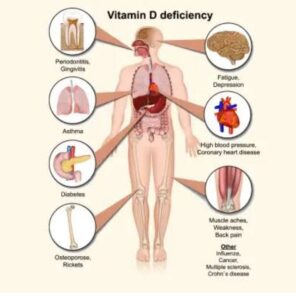
Vitamin D is a fat-soluble vitamin that plays critical roles in the proper functioning of your body, including bone health and immunity. It may even help prevent cancer and protect against several chronic conditions, including:
- bone loss
- depression
- type 2 diabetes
- heart disease
- multiple sclerosis
However, vitamin D deficiency is one of the most common nutritional deficiencies worldwide. Vitamin D deficiency is a common vitamin deficiency that causes issues with your bones and muscles. It most commonly affects people over the age of 65 and people who have darker skin. It’s preventable and treatable.
Vitamin D deficiency means you don’t have enough vitamin D in your body. It primarily causes issues with your bones and muscle.
Vitamin D is an essential vitamin that your body uses for normal bone development and maintenance. Vitamin D also plays a role in your nervous system, musculoskeletal system and immune system.
Most people with vitamin D deficiency are asymptomatic.1 Only with a severe and prolonged deficiency do symptoms arise.
The major role of vitamin D is to absorb calcium and phosphorus from the intestines in order to build and maintain bone mass.2 With vitamin D deficiency, this cannot occur adequately. With a severe deficiency, bone softening (a condition called osteomalacia in adults and rickets in children) may develop.
Who does vitamin D deficiency affect?
Anyone can have vitamin D deficiency, including infants, children and adults.
Vitamin D deficiency may be more common in people with higher skin melanin content (darker skin) and who wear clothing with extensive skin coverage, particularly in Middle Eastern countries.
Symptoms and Causes
Severe lack of vitamin D in children causes rickets. Symptoms of rickets include:
- Incorrect growth patterns due to bowed or bent bones.
- Muscle weakness.
- Bone pain.
- Deformities in joints.
Lack of vitamin D isn’t quite as obvious in adults. Signs and symptoms might include:
- Fatigue.
- Bone pain.
- Muscle weakness, muscle aches or muscle cramps.
- Mood changes, like depression.
However, you may have no signs or symptoms of vitamin D deficiency.
What causes vitamin D deficiency?
In general, the two main causes of vitamin D deficiency are:
- Not getting enough vitamin D in your diet and/or through sunlight.
- Your body isn’t properly absorbing or using vitamin D.
There are several specific causes of vitamin D deficiency, including:
- Certain medical conditions.
- Weight loss-surgeries.
- Certain medications.
Medications that can cause vitamin D deficiency
Certain medications can lower vitamin D levels, including:
- Laxatives.
- Steroids (such as prednisone).
- Cholesterol-lowering drugs (such as cholestyramine and colestipol).
- Seizure-preventing drugs (such as phenobarbital and phenytoin).
- Rifampin (a tuberculosis drug).
- Orlistat (a weight-loss drug).
Diagnosis and Tests
Your doctor need to check your levels if you have certain medical conditions or risk factors for vitamin D deficiency and/or have symptoms of it.
Your provider can order a blood test to measure your levels of vitamin D. The most common is the 25-hydroxyvitamin D, known as 25(OH)D for short.
A simple blood test called 25-hydroxyvitamin D or 25(OH)D can be used to diagnose vitamin D deficiency.
While there is no definitive consensus about what a normal, healthy vitamin D level is, the Institute of Medicine (IOM) defines it as follows:
- Normal: 25 (OH)D level greater than 20 ng/mL
- Insufficient: 25 (OH)D level between 12 to 20 ng/mL
- Deficient: 25 (OH)D level less than 12 ng/mL
- High enough to cause adverse effects: 25 (OH)D greater than 50 ng/mL
Treatment
Supplements
There are two major forms of vitamin D: vitamin D2 (ergocalciferol) and vitamin D3 (cholecalciferol), the latter of which is used in most supplements.
There are a few foods that naturally have some vitamin D, including:
- Fatty fish such as salmon, tuna and mackerel and sardines.
- Rainbow trout.
- Beef (cow) liver.
- Mushrooms.
- Egg yolks.
- Cod liver oil.
A doctor may also recommend you go outside more because sunlight is a natural source of vitamin D. However, it’s important to take precautions by limiting your total time in the sun.

drmayurikokare.com 8 Jul 2025
Thank you all for visiting page